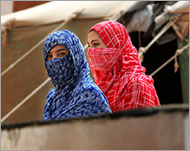Landmark anniversary in W Sahara
The Polisario Front is marking 30 years of struggle for an independent Western Sahara with little hope in sight for a solution to Africa’s longest-running territorial dispute.

Tens of thousands of refugees have lived in sprawling desert refugee camps in one of Africa’s remotest corners since Morocco‘s 1975 seizure of most of the mineral-rich desert territory, which may also have offshore oil deposits.
Polisario proclaimed the Sahrawi Arab Democratic Republic (SADR) on 27 February 1976, but years of war followed by more years of UN-backed diplomacy involving Washington, Morocco and Algeria have failed to bring the state-in-waiting into being.
Western Sahara, a vast former Spanish colony rich in phosphates and a short flight from the Canary Islands, was annexed in 1975 by Morocco after Spain withdrew.
After 16 years of intermittent guerrilla war from 1976 to 1991, years of UN-sponsored diplomatic efforts to hold a referendum on self-determination have led only to standoff.
A UN-mediated truce came with the pledge of a referendum on Western Sahara, but Morocco has refused to allow a vote on self-determination. Polisario’s principal backer is Algeria.
Heavy rains
Heavy rains earlier in February washed away the homes of about 50,000 of the 158,000 refugees who have lived near the Algerian town of Tindouf for 30 years since fleeing their homes.
|
“The time has come to pressure Morocco to accept the referendum solution as the only and unique solution” Mohamed Abdelaziz, |
Mohamed Abdelaziz, the Polisario Front president, said: “This catastrophe shows once again that the Sahrawi issue must be solved as soon as possible.”
He said: “The time has come to pressure Morocco to accept the referendum solution as the only and unique solution.”
Algeria‘s backing of the Polisario has been a constant cause of friction with neighbouring Morocco and a major obstacle to ambitious plans for regional trade and political integration.
Tension remains high along a 2000-km wall of sand and stone which snakes through the rocky wilderness to the Atlantic coast, separating Moroccan and Polisario forces.
The Sahrawi refugees live in five camps in the desert near the border, almost totally dependent on outside assistance.
Infringement
 |
|
Morocco insists independence |
For the first time celebrations will take place on the “Polisario” side of the wall in the village of Tifariti, a move Morocco has said is an infringement of the 1991 ceasefire. Normally Polisario’s celebrations are held in Algeria.
Nabil Benaballah, the Moroccan government spokesman and Communications Minister, said: “Morocco will find the right way to counter the Polisario move.”
Journalists and officials were on their way to Tifariti from Tindouf on Sunday for Monday’s festivities.
Morocco has insisted that independence cannot be an option, even as the Polisario Front insists that it has to be.
King Mohammed sounded a defiant note in 2002. He said: “We…categorically reject any project aiming to harm the territorial integrity of Morocco and sovereignty over its southern provinces (Western Sahara).”
“Morocco will not abandon a single inch of its southern provinces.”
Moroccan officials have said that in April Rabat will put forward a formal plan for autonomy for the area. Polisario rejected the plan in advance, saying a referendum was the only way forward.